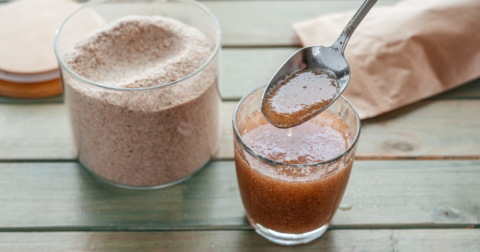Explainer
Why Are Alternative Milks More Expensive Than Dairy?
Diet•9 min read
Reported
Something unpleasant happens to your body when you stop eating vegetables.


Words by Jessica Scott-Reid
Many Americans can’t poop. Around 2.5 million people in the U.S. visit their doctor each year due to constipation, in fact, and more broadly, digestive issues plague 60-70 million Americans. The problem has become so pervasive that the market for fiber supplements, probiotics, anti-bloat and anti-gas remedies has seen a notable upturn, predicted to reach $8 billion in revenue in the next decade . But what exactly are Americans eating to cause all this tummy trouble? And are these quick cures the answer?
Below a photo of a meat and cheese-packed charcuterie board you’ll find a list of tips for your tummy, including the suggestion to take a supplement. One social media ad for anti-bloat treatment reads: “Fart Wherever You Want. Nobody Will Smell a Thing.” And another: “Pooping everyday. Works amazing.” Branded with names such as “Colon Broom,” “FixBiome,” and “Seed,” the online rabbit hole for digestive supplements does indeed run deep.
We all need fiber for our digestive systems to function properly. In fact, doctors recommend at least 25 grams for women age 50 or younger and 38 grams for men of the same age. Yet time and again, national surveys have found that few people in the United States are actually consuming enough of this vital carbohydrate. In fact, one 2017 study published in the American Journal of Lifestyle Medicine found that 95 percent of all Americans are not getting the recommended amount.
Here’s the problem: fiber is abundantly and exclusively found in plant-based foods and ingredients, and is not found in meat or dairy products. Yet it seems some dieters who follow meat-heavy diets like keto, paleo and carnivore end up taking in much less fiber than what most doctors recommend, sometimes even none at all. Of the three, the carnivore diet is the most restrictive, allowing no grains, legumes or produce, while both keto and paleo do allow for some sources of fiber, albeit limited ones.
Paleo dieters — who forgo grains and legumes to eat more fat and meat — can eat some non-grain plant foods, and take specific paleo-friendly fiber supplements made of psyllium husk, fruit and seeds. Still, writes The Paleo Mom, “constipation is a relatively common complaint during the adjustment period when people first transition to a Paleo diet.”
And then there’s the carnivore diet. “The carnivore diet is extremely restrictive, which has many negative effects on health and well-being,” writes Kirsten Jackson, a consultant gut health dietitian and founder of The Food Treatment Clinic. These negative effects can include nutrient deficiencies, elevated cholesterol and even “an increased risk of cardiovascular diseases,” among other serious conditions.
Some proponents of the carnivore diet claim, falsely, that the human need for fiber is a myth, and that early hunters did not consume any plant foods. Carnivore diet “coaches” typically recommend consuming no fiber at all (although, digging in we find some admit to eating fruit), but rather things like cow liver and fermented cheeses, magnesium supplements or simply more water, if constipation becomes a problem.
This persistent lack of fiber can indeed cause digestive issues. Social media channels are rife with firsthand accounts of people dealing with constipation while on meat-heavy diets. “I just started a carnivore diet back in December,” writes one social media user in February. “I have only passed stool maybe three times since going on a carnivore diet.”
“I’m doing all the recommended protocols for constipation — magnesium, water, salt, melted fat — but it’s like the gut completely stopped working without fiber,” writes another.
One Guardian writer tried the Carnivore Diet for a week, describing it as “punishingly awful,” even noting that the experience at the start, including the constipation, is commonly known as the “trough of despair.”
It’s not surprising people turn to supplements. Scientists are looking more closely at the role our gut plays in overall health and, Jackson tells Sentient, “naturally, people are keen to trial supplements which may help them.”
The global digestive health market is projected to yield $8 billion in revenue by the end of 2033, up from $4 billion in 2022, according to Research Nester. That market growth, the group notes, “is primarily driven by the rise in digestive disorders including irritable bowel syndrome, constipation” and others. And within that broad market, the more specific digestive health supplement sector is also booming, worth over $10.5 million globally in 2022, and forecasted to grow to over $23 million by the end of 2033.
Most digestive supplements are made up of plant ingredients: fruits, vegetables, seeds, grains, herbs, etc., sometimes also bacteria and/or enzymes, simply blended up and concentrated into capsules or powders. But as Jackson explains, multiple studies show the benefits of a high-fiber diet do not seem to extend to people just taking fiber in supplement form. In other words, she says, for most people, “having fiber via food is actually far more beneficial because they also then gain the micronutrients contained within these foods.”
Ultimately, Western fad diets tend to put great focus on protein, particularly the kind sourced from animals. “Americans are oddly obsessed with protein,” writes Kenny Torrella for Vox, “consuming around twice the daily amount recommended in the federal dietary guidelines.” But the vast majority of Americans — like the majority of Canadians and Europeans — are not protein deficient at all. Most of us are actually fiber deficient. And it turns out that turning to viral supplement brands promising to cleanse the colon, cut the constipation and banish the bloat, may not be the solution. On the other hand, consuming enough fiber from plant food, notes Jackson, is “paramount for your body to be able to produce” . . . well, you know.